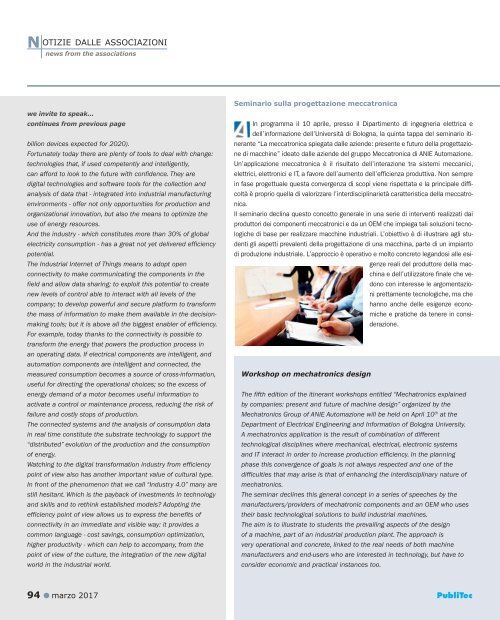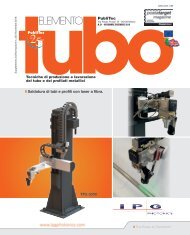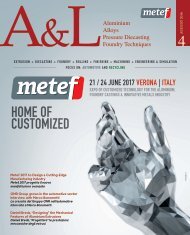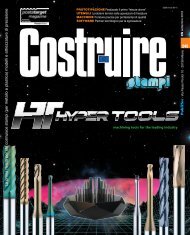PUB_INMOTION_n31_MARZO_2017_Interno96pag_160_PlanciaLR
Create successful ePaper yourself
Turn your PDF publications into a flip-book with our unique Google optimized e-Paper software.
N<br />
OTIZIE DALLE ASSOCIAZIONI<br />
news from the associations<br />
we invite to speak...<br />
continues from previous page<br />
billion devices expected for 2020).<br />
Fortunately today there are plenty of tools to deal with change:<br />
technologies that, if used competently and intelligently,<br />
can afford to look to the future with confidence. They are<br />
digital technologies and software tools for the collection and<br />
analysis of data that - integrated into industrial manufacturing<br />
environments - offer not only opportunities for production and<br />
organizational innovation, but also the means to optimize the<br />
use of energy resources.<br />
And the industry - which constitutes more than 30% of global<br />
electricity consumption - has a great not yet delivered efficiency<br />
potential.<br />
The Industrial Internet of Things means to adopt open<br />
connectivity to make communicating the components in the<br />
field and allow data sharing; to exploit this potential to create<br />
new levels of control able to interact with all levels of the<br />
company; to develop powerful and secure platform to transform<br />
the mass of information to make them available in the decisionmaking<br />
tools; but it is above all the biggest enabler of efficiency.<br />
For example, today thanks to the connectivity is possible to<br />
transform the energy that powers the production process in<br />
an operating data. If electrical components are intelligent, and<br />
automation components are intelligent and connected, the<br />
measured consumption becomes a source of cross-information,<br />
useful for directing the operational choices; so the excess of<br />
energy demand of a motor becomes useful information to<br />
activate a control or maintenance process, reducing the risk of<br />
failure and costly stops of production.<br />
The connected systems and the analysis of consumption data<br />
in real time constitute the substrate technology to support the<br />
“distributed” evolution of the production and the consumption<br />
of energy.<br />
Watching to the digital transformation industry from efficiency<br />
point of view also has another important value of cultural type.<br />
In front of the phenomenon that we call “Industry 4.0” many are<br />
still hesitant. Which is the payback of investments in technology<br />
and skills and to rethink established models? Adopting the<br />
efficiency point of view allows us to express the benefits of<br />
connectivity in an immediate and visible way: it provides a<br />
common language - cost savings, consumption optimization,<br />
higher productivity - which can help to accompany, from the<br />
point of view of the culture, the integration of the new digital<br />
world in the industrial world.<br />
Seminario sulla progettazione meccatronica<br />
In programma il 10 aprile, presso il Dipartimento di ingegneria elettrica e<br />
dell’informazione dell’Università di Bologna, la quinta tappa del seminario itinerante<br />
“La meccatronica spiegata dalle aziende: presente e futuro della progettazione<br />
di macchine” ideato dalle aziende del gruppo Meccatronica di ANIE Automazione.<br />
Un’applicazione meccatronica è il risultato dell’interazione tra sistemi meccanici,<br />
elettrici, elettronici e IT, a favore dell’aumento dell’efficienza produttiva. Non sempre<br />
in fase progettuale questa convergenza di scopi viene rispettata e la principale difficoltà<br />
è proprio quella di valorizzare l’interdisciplinarietà caratteristica della meccatronica.<br />
Il seminario declina questo concetto generale in una serie di interventi realizzati dai<br />
produttori dei componenti meccatronici e da un OEM che impiega tali soluzioni tecnologiche<br />
di base per realizzare macchine industriali. L’obiettivo è di illustrare agli studenti<br />
gli aspetti prevalenti della progettazione di una macchina, parte di un impianto<br />
di produzione industriale. L’approccio è operativo e molto concreto legandosi alle esigenze<br />
reali del produttore della macchina<br />
e dell’utilizzatore finale che vedono<br />
con interesse le argomentazioni<br />
prettamente tecnologiche, ma che<br />
hanno anche delle esigenze economiche<br />
e pratiche da tenere in considerazione.<br />
Workshop on mechatronics design<br />
The fifth edition of the itinerant workshops entitled “Mechatronics explained<br />
by companies: present and future of machine design” organized by the<br />
Mechatronics Group of ANIE Automazione will be held on April 10 th at the<br />
Department of Electrical Engineering and Information of Bologna University.<br />
A mechatronics application is the result of combination of different<br />
technological disciplines where mechanical, electrical, electronic systems<br />
and IT interact in order to increase production efficiency. In the planning<br />
phase this convergence of goals is not always respected and one of the<br />
difficulties that may arise is that of enhancing the interdisciplinary nature of<br />
mechatronics.<br />
The seminar declines this general concept in a series of speeches by the<br />
manufacturers/providers of mechatronic components and an OEM who uses<br />
their basic technological solutions to build industrial machines.<br />
The aim is to illustrate to students the prevailing aspects of the design<br />
of a machine, part of an industrial production plant. The approach is<br />
very operational and concrete, linked to the real needs of both machine<br />
manufacturers and end-users who are interested in technology, but have to<br />
consider economic and practical instances too.<br />
94 l marzo <strong>2017</strong> PubliTec





